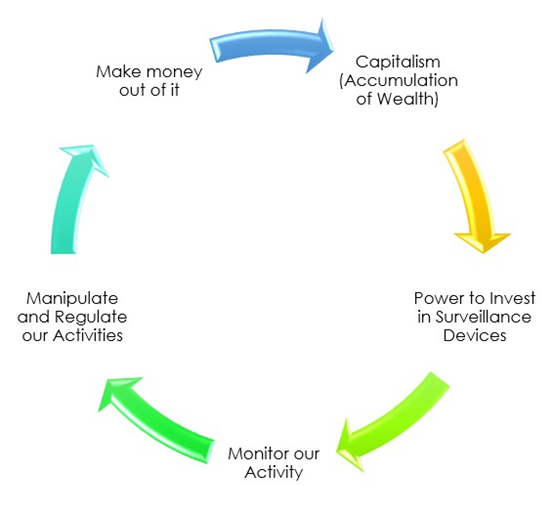Yes, you rightly guessed from the title. It is one of the most influential literary works of the past century, George Orwell’s “Nineteen Eighty-Four,” where the British journalist warned us about the most dystopian world under a totalitarian state.
It is hard to talk about surveillance, propaganda, and
post-truth without referring to Orwell’s work. The phrases like ‘Orwellian
State’ or ‘Surveillance Society’ have become synonymous with any state-sponsored
all-knowing oppressive force. However, in the last two decades, with the advent
of the internet and so-called ‘smart’ technologies, the state of surveillance
in our everyday lives has become less pertinent to what Orwell thought of as a
“Surveillance State.”
Although the surveillance society that had been predicted
had finally arrived, it did so in the cool duds of high-tech efficiency rather
than the heavy boots of ruthless despotism. It presented itself through a
million screens of smartphones and mobile gadgets, far from the technocratic
gaze of Big Brother’s sole scary telescreen.
The characters in “1984” lived in a constantly nagging
quandary of how, why, and when they were being surveilled. On the contrary,
this new age of surveillance is fuelled by our actions online - every click,
every photo we share, and sometimes you even don’t have to do anything but
carry your smartphone wherever you go, which you do out of your convenience or
need. This modern form of surveillance poses no material harm and apparently
any negative connotation we care about at first glance.
In simple words, Capitalism is the accumulation of wealth, and when this wealth is invested in surveillance devices, which allows capitalists to monitor our activities and which in turn allows them to manipulate and regulate our behavior, which in turn makes them more money. This whole system has been happening for the last two decades, and the surveillance capitalists operate without any legal or regulatory purview. Even more disturbing is that even the CCTVs all around us, which is essentially the public sector, are also manufactured and serviced by this surveillance capitalism.
You know, Surveillance Capitalists love our faces. The human face contains over two dozen muscles, which can be analyzed to monitor our facial expressions and emotions. So, every time you unlock your phone with your face, it is not just the phone unlocks; it unlocks your mood to the AI. This a kind of “thought policing” Orwell thought of, not to drag you to the prison (or maybe) like in “1984”, but to deliver you content and targeted advertising.
Now coming to the people who don’t care if Google knows
everything about them because they think, “I have nothing to hide.” But the
reality is that IF YOU HAVE NOTHING TO HIDE, YOU ARE NOTHING.
Because everything that makes you, “you”, the source of your identity, the
source of your autonomy in your urge to self-determination, these are resources
that you grow with, and these are intended to be private.
Apart from all this, you will care when next year, you
will find out your health insurance premium has doubled because they know what
fast foods you are ordering in Swiggy, and they know that you are not active
enough through your smartwatch. That will surely hurt, and that will make you
realize the importance of privacy.
Surveillance capitalism exerts oligopolistic power over
virtually all digital information and communication spaces. Yet there is more
to consider than just concentrating economic power and its remedies in economic
regulation and antitrust law. There is, however, more to consider for those who
approach analysis only through the prism of concentrated economic power and its
remedies in economic regulation and antitrust law. When economic activities
that generate revenue are based on the commodification of humans, the
traditional economic playing field is muddled. Economic power concentration
leads to collateral concentrations of governance and social power. The
institutional growth of surveillance capitalism weaves these three axes of
power into an ever-powerful force that begins with economic operations and then
contends with democracy for governance and social control. In the economic
realm, oligopoly gives way to oligarchy in the societal sphere.
If data is the new oil, you are the mighty mines and
surveillance is the excavation process. So,
next time you pick up your phone, know one thing, you are not using social
media; social media is using you; you are not searching on google; google is
searching and making a profile of you. And it’s not just about you, it’s about
us all, it’s about how we envision our future, our society.






